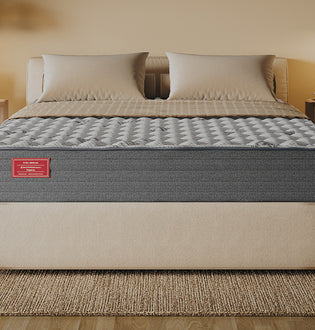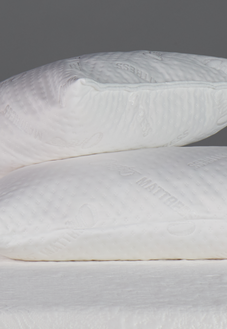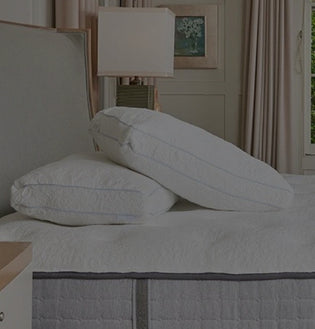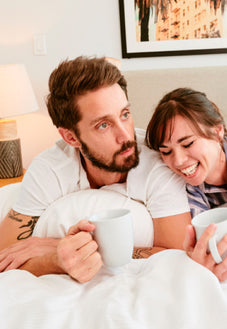How the Right Mattress Can Help Manage Sleep Disorders and Improve Rest
If you struggle with sleep disorders like insomnia, sleep apnea, or restless legs syndrome (RLS), the right mattress can be more than just comfortable — it can actively improve your sleep quality. A well-designed mattress supports healthy posture, reduces pressure points, and minimizes disruptions so you get deeper, more restorative rest.
Insomnia: Building the Foundation for Restful Nights
Insomnia is often powered by discomfort, overheating, or the inability to settle into the bed. Your mattress plays a big role.
-
Memory foam designs are excellent for insomnia: they contour your body, reduce pressure, and minimize motion transfer, keeping disturbances from a tossing partner to a minimum.
-
Latex mattresses also relieve pressure but offer better breathability, making them ideal for people who sleep hot.
-
Hybrid models (foam + coils) blend airflow and support, helping you find a steady, comfortable sleep position.
OrthoMattress Picks for Insomnia:
-
Avenue II Plush — a memory foam-based model with a softer feel, ideal for contouring and comfort.
-
Continental II Medium — a hybrid in the Orthoplex line offering balanced support and pressure relief.
-
Club I Pillow Top — an innerspring option with added top cushioning for a plush yet supported feel.
These choices allow you to test different comfort types (memory, hybrid, innerspring) so you can see what helps you sleep best.
Sleep Apnea: Support and Position Matter
With sleep apnea, breathing interruptions often worsen when sleeping on your back or when your airway is restricted. So your mattress must encourage favorable sleeping posture and maintain spinal alignment. The ideal mattress for sleep apnea will:
-
Promote side-sleeping, which helps keep airways open.
-
Support the spine so the neck and airway stay aligned.
-
Work with adjustable bases, letting you elevate the head or torso for easier breathing.
OrthoMattress Options for Sleep Apnea:
-
Continuum II Firm (Orthoplex series) — a hybrid model with firm support, suitable for use with adjustable bases.
-
Signature Hybrid Firm — balances support and contour, ideal for maintaining alignment and avoiding “sinking” into the wrong posture.
These mattresses help you stay in optimal positions overnight, reducing airway obstruction.
Restless Legs Syndrome: Motion Isolation and Pressure Relief
RLS is characterized by leg discomfort and urges to move—often at night. A mattress can’t cure RLS, but it can help reduce how disruptive it is.
What to look for:
-
Strong pressure relief, especially around hips and legs.
-
Excellent motion isolation, so your movements don’t disturb a partner.
-
Cooling technology (e.g. gel-infused foam or breathable covers) to reduce overheating, which may worsen RLS symptoms.
OrthoMattress Choices for RLS:
-
Avenue II Plush — soft, pressure-relieving memory foam that spreads weight and eases leg strain. Ortho Mattress, Inc.
-
Signature Hybrid Medium — offers cushioning plus coil support, with decent edge support and motion control. Ortho Mattress, Inc.
-
Club Signature IV Pillow Top — an innerspring model with a plush top layer to dampen motion. Ortho Mattress, Inc. Ortho Mattress,
These models strike a balance between comfort and support while minimizing motion transfer.
Choosing the Right Mattress: A Smart Investment in Your Health
Sleep disorders affect more than your nights—they affect your mood, memory, and overall health. Choosing the right mattress is a step toward better well-being.
Tips for selecting wisely:
-
Focus on pressure relief, cooling features, and strong spinal support.
-
Take advantage of sleep trials to test comfort risk-free.
-
Use an adjustable base if your condition benefits from elevated head positioning (especially for sleep apnea).
-
Remember: a mattress helps—but it’s not a substitute for medical care. Always see a sleep specialist if symptoms persist.
Final Thoughts: Sleep Better, Live Better
A great mattress won’t cure insomnia, sleep apnea, or RLS on its own. But it can dramatically reduce nightly disturbances and support deeper sleep. When your mattress works with you—not against you—you’re much more likely to wake feeling refreshed and ready for the day.
Find My Perfect Mattress
Finding the right mattress isn't always easy, so our experts are here to help! Answer a few simple questions about yourself, and we'll give our best recommendation based on your sleep habits, environment and preference
Let's Get Started




